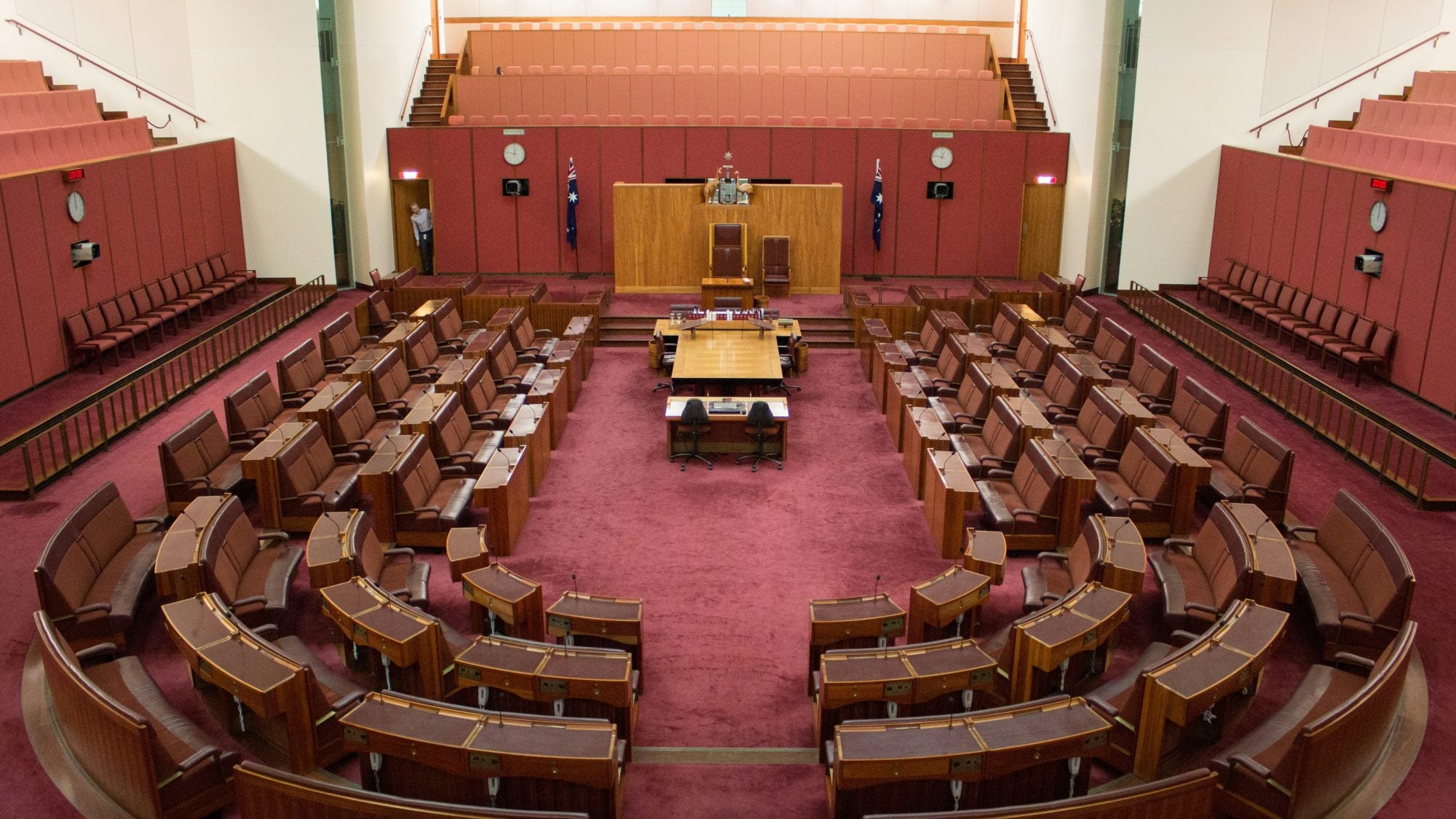
Title: Learning from Australia: Strengthening Congressional Scrutiny of Federal Agency Rulemaking
This article considers insights from the Australian Parliament’s Senate standing committee that systematically scrutinizes new agency rules under established scrutiny principles. This model offers important lessons for strengthening Congressional oversight in the United States, where the lack of Congressional scrutiny and the high volume of agency rulemaking are the most pressing issues. Drawing on the Australian model, this article emphasizes the advantages of a systematic, bipartisan, and principles-based approach over the current ad hoc, partisan, and policy-driven approach in the United States.
The Congressional oversight of the executive branch remains one of the most powerful means of checking executive power. In his 1885 book Congressional Government: A Study in American Politics, Woodrow Wilson emphasized the critical role of Congress in maintaining “vigilant oversight of administration.” Despite this fundamental responsibility, Congress currently lacks a systematic approach to scrutinizing new rules made by federal agencies. This accountability gap presents a major challenge to both democratic principles and the rule of law.
Agency rules, which carry the force of law, directly impact the lives of citizens, like ordinary laws passed by Congress. To provide regulatory flexibility, Congress often delegates broad rulemaking powers to federal agencies in a variety of areas such as food and drugs, veterans’ benefits, and environmental protection. For example, the Department of Homeland Security issues rules that establish immigration requirements, including the detention, removal, and treatment of asylum seekers.
Two compelling reasons should motivate Congress to take a more active role in scrutinizing agency rulemaking. First, federal agencies are only indirectly accountable to the people. Members of federal agencies are appointed. Although some are confirmed by the Senate, they do not hold the same representative credentials as directly elected members of Congress. Moreover, agency decision-making is often conducted in secrecy, with deliberations exempted from freedom of information laws. Agency rules, therefore, are less transparent and have a lesser democratic quality compared to Congressional laws that are made openly and on the public record, and which are infused with popular legitimacy.
Second, agency rules are being made at an unprecedented pace, surpassing Congressional laws as the primary source of new federal law. The 2021 United States Code, which compiles general Congressional laws enacted since 1789, spans nearly 51,000 pages. By comparison, federal agencies published over 90,000 pages of final and proposed rules in just one year alone. As the sole branch of government endowed with legislative authority by the US Constitution, Congress has a constitutional imperative to actively oversee this vast and growing body of new federal law.
Closing the Accountability Gap Through Congressional Oversight
Since 1996, the Congressional Review Act (CRA) has facilitated Congressional scrutiny of federal rules through the creation of a rule revocation process. It has not, however, been used as part of a systematic form of scrutiny, instead being used for sporadic reviews of contentious rules. As a result, only twenty rules have been overturned through the CRA process in its nearly three-decade history.
Recently, courts have started to play a more active role in filling the accountability gap left by Congress. The Supreme Court of the United States has articulated the ‘major questions doctrine’ that prevents agencies from making rules determining significant economic and political policy questions without clear Congressional authorization. The Supreme Court also recently decided two related cases–Loper Bright Enterprises v. Secretary of Commerce and Relentless, Inc. v. Department of Commerce–which enhanced the judicial oversight of agencies. In both cases, the Court ruled that federal agencies cannot be the final arbiters of the scope of their own authority to make a particular rule if the Congressional delegation of that authority is ambiguous or silent.
While these rulings represent an important step toward enhancing agency accountability, the reliance on court processes is problematic, as it depends on an aggrieved person to bring a claim. The high cost of litigation places this potential recourse beyond the reach of many, creating a barrier to accessing justice. As a result, the scrutiny of agency rules through the courts becomes reactive and ad hoc rather than systematic and consistent.
Far greater accountability could be achieved if Congress clearly defined the rulemaking powers delegated to federal agencies–not leaving such critical questions to be resolved in the courts. Just as significantly, Congress should also systematically scrutinize all newly made agency rules to promote fidelity to its intent. Systematic scrutiny would correct a power imbalance between the executive and legislative branches, reasserting Congress as the nation’s lawmaker-in-chief.
Lessons From Australia
The United States can draw valuable lessons from the Australian approach to rule scrutiny. In Australia, like the United States, most federal laws are made by the executive branch through agency rules, known as ‘delegated legislation.’ However, under Australia’s version of the CRA, either the House or Senate can revoke a rule by a simple majority. This lower threshold contrasts with the CRA, which requires agreement from the House, Senate, and President, or a supermajority in both chambers, making revocation unlikely. This higher bar largely prevents Congress from revoking agency rules, which does not incentivize good agency rulemaking.
The consequences of revocation in Australia are also less severe: if a rule is revoked, it simply ceases to have effect from that point forward without invalidating actions already taken under it. In contrast, under the CRA, if a rule is revoked, it “shall be treated as though such rule had never taken effect.” This retrospective nullification undermines important rule of law values such as legal certainty and predictability, as it removes the legal basis for actions already taken under the rule prior to its revocation, potentially leading to legal confusion. For instance, immigration visas granted under a rule that is later overturned under the CRA would be rendered legally invalid, posing complex challenges to determining individuals’ legal status. Compared to the Australian system, the consequences of CRA revocation in the United States raise the stakes of revocation significantly, making it less likely and further diminishing Congress’s ability to ensure that agencies engage in good rulemaking practices.
The success of the Australian approach is also attributable to a standing committee dedicated to scrutinizing the high volume of federal rules against well-defined scrutiny principles contained in the Senate’s standing orders. These principles do not empower the committee to consider the policy implications of agency rules; rather, they focus on the rule’s technical qualities and implications for the rule of law. They include the requirements that a rule must fall within the powers conferred on the agency, that there must be adequate consultation with stakeholders, that the rule is clearly and accurately drafted, and that there is sufficient explanatory material to understand the rule’s likely operation. These principles ensure that rules do not infringe personal rights and that they do not address matters better left to the legislative process. Federal agencies widely understand and consistently apply these principles when developing new rules, with the committee offering detailed guidance on how it applies the scrutiny principles. The bipartisan nature of the committee, which operates by consensus, reflects a broad agreement on the importance of these principles.
The contrast with the United States is stark. In Congress, the House Rules Committee, controlled by the majority party, reviews federal rules on an ad hoc basis, lacking any reference to scrutiny principles or defined criteria. In the 118th Congress, the Committee published fewer than ten reports that considered revoking a rule, with all decisions being made strictly along partisan lines.
The Australian system also provides additional tools to resolve concerns with agency rules. When identified by the Australian committee, a concern may be raised informally with the agency or escalated to the responsible minister. Absent a satisfactory resolution, the committee may attempt to revoke the rule through Senate proceedings. This approach provides flexibility and multiple avenues through which rules can be changed. The Australian model further promotes flexibility in revising agency rules, as it allows for the revocation of only the offending components of a rule, providing a more targeted and nuanced response. In every case where the committee has sought revocation of an agency rule, a majority of the Senate has voted to revoke it. However, revocation is rare in practice as the committee is often successful in having its concerns addressed before that ultimate step is necessary, as can be seen in its most recent annual report.
Under the CRA in the United States, a rule must be revoked in its entirety with no option to revoke only a specific part. This all-or-nothing approach makes it less likely that a rule will be revoked unless it presents a major concern. The CRA also prohibits an agency from re-making a revoked rule in “substantially the same form” unless specifically authorized by a new Congressional law. In the Australian model, a rule with the same substance can be remade by the agency after six months. The restrictions under the CRA compromise regulatory flexibility, which hamper the government’s ability to respond quickly to emerging issues or changing circumstances, making the use of revocation less likely.
Recommendations for Reform
Recent reform efforts, like the REINS Act of 2023, suggest growing Congressional interest in enhancing oversight of agency rulemaking. To strengthen democratic accountability, the United States should consider two key reforms taken from the Australian approach:
1. Establish a Dedicated Scrutiny Committee
Congress should establish a dedicated, bipartisan, and well-resourced standing committee to scrutinize all new federal rules against a defined set of scrutiny principles. These principles must ensure agencies’ adherence to Congressional intent and good rulemaking practice. By focusing on the technical qualities of rules and fundamental rule of law values rather than underlying policy objectives, the committee is more likely to operate effectively and in a non-partisan manner. The committee should also adopt a gradually escalating approach in relation to concerns it identifies, including first engaging with the relevant agency to foster cooperation before resorting to formal revocation.
2. Amend the Congressional Review Act
Second, Congress should amend the CRA to enhance its effectiveness as a tool of democratic accountability. This should involve lowering the Congressional voting threshold for revocation, ensuring that rule revocation does not impact past actions, permitting the partial revocation of rules and allowing revoked rules to be re-made after a set period of time. These amendments would incentivize agencies to adopt better rulemaking practices.
Conclusion
By implementing systematic oversight of agency rulemaking and improving the CRA revocation process, Congress can correct the balance of power between the executive and legislative branches and fulfill its constitutional role as the source of legislative authority. These reforms will align agency rulemaking with democratic principles and the rule of law, alleviating the burden on individuals to seek redress in the courts for executive overreach.
. . .
Dr. Lorne Neudorf is Dean and Professor at La Trobe Law School, La Trobe University in Melbourne, Australia. He is also the External Legal Adviser to the Australian Senate Standing Committee for the Scrutiny of Delegated Legislation. The author extends his gratitude to Ben Wickham for his insightful comments on an earlier draft.
Image Credit: Gerda, Unsplash, via Unsplash Content License.
Recommended Articles

Africa accounts for approximately two percent of global air travel. Given the continent’s vast size and large distances between major trade hubs, enhancing intra-African air connectivity will be…

An estimated 7.9 million Venezuelans migrated abroad for the long term under President Nicolás Maduro’s rule as Venezuela’s political, economic, and social crises have deepened. Alongside rising Venezuelan migration, migrants…

Amid stalled U.S. federal climate engagement and intensifying transatlantic climate risks, subnational diplomacy has emerged as a resilient avenue for cooperation. This article proposes a Transatlantic Subnational Resilience Framework (TSRF)…